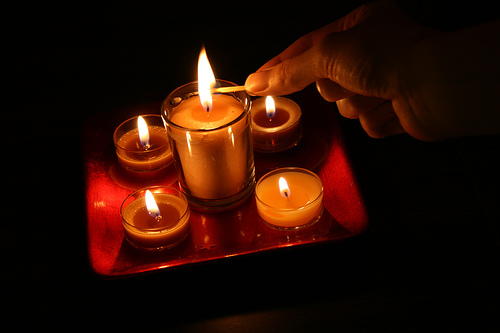|
|

by Marcellino D'Ambrosio, Ph.D.
Faith, hope, and love. St. Paul, in I Corinthians 13:13, says these three are the bottom line. They are called the theological virtues, the qualities that make us most like God.
We hear plenty about faith and love. But when is the last time you heard a rousing homily on hope? Why is hope important? And what is it precisely?
To accomplish great things in life, you need a future goal that is big enough to keep you motivated. The promise of a diploma makes college students stay up late writing papers when they'd rather be partying. The dream of Olympic glory gets the runner up early to put in miles while others are comfortably snoozing.
In the spiritual life, you'll never do great things for God unless you have your eye on the long term goal — indescribable joy in his presence forever. The ecstasy of gazing upon Him whose beauty eternally awes the hosts of heaven, the exhilarating company of friends, family, and fascinating people from all ages — purified, glorified, finished masterpieces of divine love — this is what "the day of Christ Jesus" (Phil 1:6) will usher in, for those who are ready.
The virtue of hope is the eager, energizing expectation of this glorious inheritance. And it's also the confidence that He who began the work of salvation in us will bring it to completion (Phil 1:6).
Some of our separated brethren think Catholics live in fearful insecurity, perpetually worrying that they may not make the grade. These Christians, on other hand, believe that once people accept Jesus as Lord and Savior, they are saved, period. God is faithful, they reason, and never reneges on his promises. Once saved, always saved.
This is partially true. God's promise is sure. He gives us grace to accept Christ and salvation. But his grace never comes in a way that short-circuits our freedom. In other words, God is a lover, not a rapist. He never overpowers us and carries us away against our will. The possibility always remains that we will walk away, as did the Prodigal Son. Fortunately the Prodigal came to his senses and returned. But note that the Father did not send out a posse. The wayward son returned of his own accord. The story could have ended otherwise.
So is there a Catholics version of "blessed assurance"? Yes. We call it hope . We have confidence that God will give us the grace to persevere, and even better, to grow stronger in his love right up to the "day of Christ Jesus."
But hope is, according to St. Thomas Aquinas, a virtue not principally of the mind that believes in God's faithfulness, but of the will that longs for heaven with a desire that propels it forward to ever greater spiritual growth.
One opposite of hope is despair , failure to believe that God's mercies are never exhausted. But hope has other opposites as well. Like sloth , or spiritual laziness. When faced with the prospect of life forever with God, sloth yawns and says "BOR-ing." Sound familiar?
Or how about presumption? Hope is humble confidence that God won't give up on me. Presumption is the arrogant expectation that God owes me mercy, regardless how neglectful I am of the means of grace, like Mass, prayer, and Confession.
Hope is a spiritual muscle. But like all muscles, it must be exercised just to survive. Unused muscles atrophy. Use it or lose it.
That's why each year the Church gives us a season of Hope, which we called Advent. Though our society has made it a season of indulgence, it is meant to be a season of training. It's time to blow on the spark of spiritual desire within us till it bursts into flame. Christmas lights are nice, but it is we who are supposed to be the light of the world.
About The Author:
Dr. D'Ambrosio studied under Avery Cardinal Dulles for his Ph.D. in historical theology and taught for many years at the University of Dallas. He now directs www.crossroadsinitiative.com, which offers Catholic resources for RCIA and adult and teen faith formation, with a special emphasis on the Eucharist, the Theology of the Body, the early Church Fathers, and the Sacrament of Confirmation.
(This article originally appeared in Our Sunday Visitor and is used by permission of the author.)
See Also:
Advent Season by Pope Benedict XVI
In Advent, Christians relive a dual impulse of the spirit: on the one hand, they raise their eyes towards the final destination of their pilgrimage through history, which is the glorious return of the Lord Jesus; on the other, remembering with emotion his birth in Bethlehem, they kneel before the Crib.Bringing Our Fallen-away Relations Back to Church During Advent by Rev. John Horgan
Each Christmas, our churches are thronged with people who come to pray, join in the singing of carols, and feel the warmth of the Saviour's love. Some of these men and women do not practice the Faith regularly. Some are estranged from the Church, angry at her teachings, hurt by her representatives; a larger number simply live their lives as if the Church had no place in their world, no bearing on their lifestyles, careers, and choices. . . except at Christmas. ...The Journey To Bethlehem is Not Comfortable! by Gary Zimak
During the season of Advent, we are all invited to travel our own personal "road to Bethlehem". When we arrive at our destination on Christmas Day, we will hopefully be closer to the Lord than when we began the journey.
MW Advent Supplement | MW Christmas Supplement | Sermons Home | Malankara World Journal | Library - Home
-------
Malankara World
A service of St. Basil's Syriac Orthodox
Church, Ohio
Copyright © 2009-2020 - ICBS Group. All Rights Reserved.
Disclaimer
Website designed, built, and hosted by
International Cyber Business Services, Inc., Hudson, Ohio